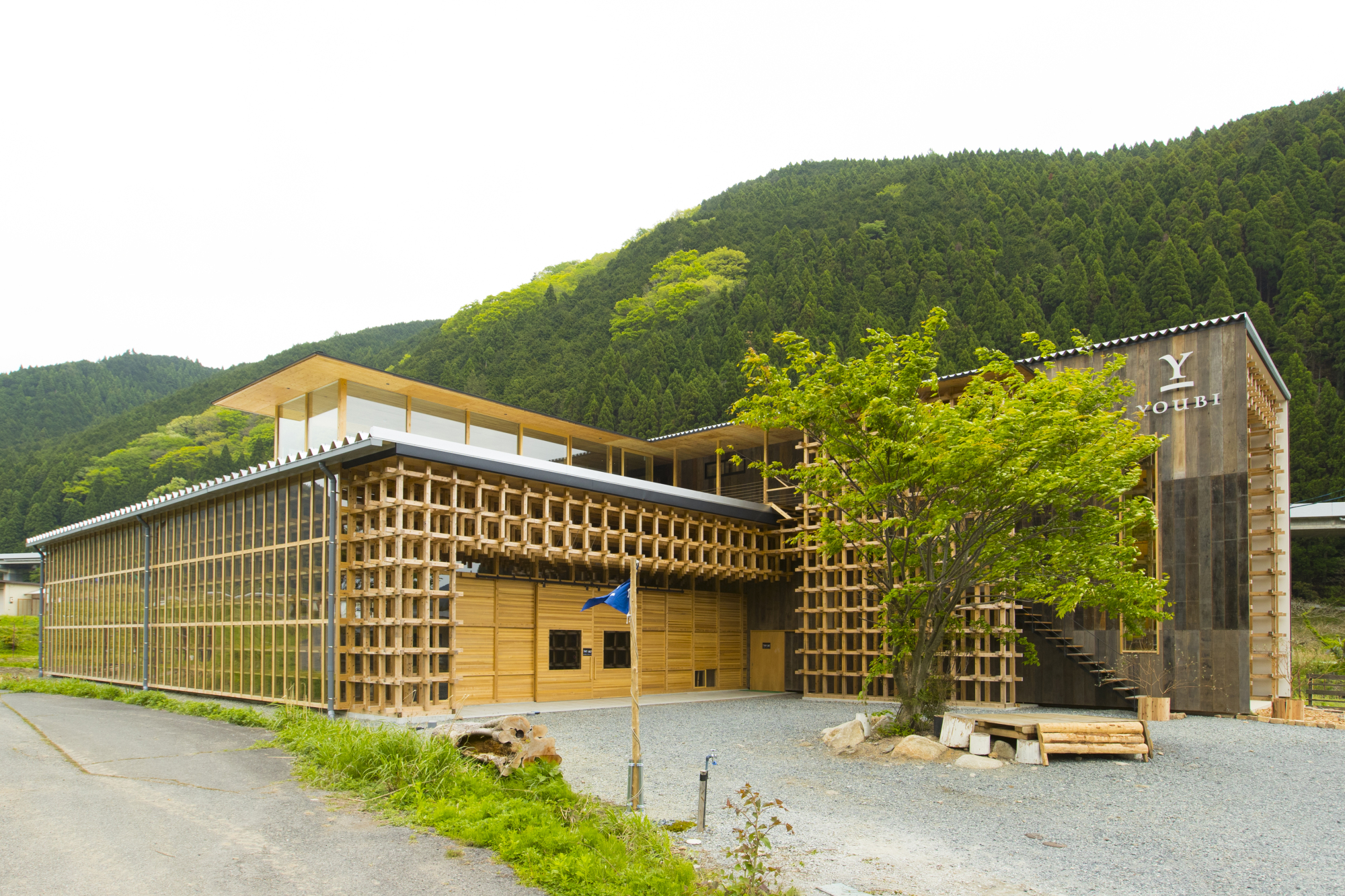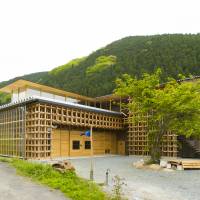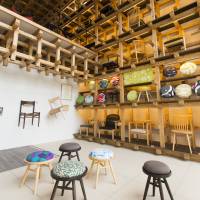A wooden, grid-like building with a huge window measuring 8.5 meters in height stands in Nishiawakura, a village in northeastern Okayama Prefecture.
This is the office and studio of Youbi Co., a group of creative woodcrafters led by Representative Director Masayuki Oshima.
He was, and still is, a furniture designer and maker, and his wife, Naoko Oshima, is an architect. Both were trainees in Takayama, Gifu Prefecture — one of the most well-known areas for handcrafted wooden furniture — when they visited Nishiawakura for the first time in the winter of 2008.
The purpose of the trip was to visit the mountains in Japan to see where the wood, such as beech and cherry, they use for their works comes from.
However, they faced an unexpected reality there. They met an older man who had worked in forestry for 50 years and he lamented that the demand for domestic trees had declined drastically.
The forests they saw consisted of cedar and cypress trees, most of which had been planted several decades ago. The trees were mature enough to be used, but at that point, no one wanted them because of increased imports of cheaper timber from abroad.
The forests were starting to degrade due to a lack of adequate clearing and management.
"We questioned what we had been doing, without realizing the problem that Japan's forests had been facing," said Naoko.
That night, Masayuki decided to move from Takayama to Nishiawakura, and in eight months, he officially relocated with his wife joining him later. "I still had things to do where I was, so I followed him after a year and a half," said Naoko.
They used an abandoned factory as their furniture studio at first, and began making products using cypress from the long-neglected forests of Nishiawakura.
They eventually extended their scope of work to include architecture and renovation, and the number of staff grew to more than 10. Most of them are in their 30s, with some coming from the local area and others hailing from across Japan.
While Youbi continued to create their products and work on architectural projects, they also focused on renovating their own studio, step by step, for six years.
However, their efforts literally turned to ash when a fire broke out at the studio in 2015. Everything burned down — the studio itself, stocked timber, furniture (both completed and partially made), tools and machines.
Yet, Masayuki's decision was again quick and full of conviction. The morning after the fire, he gathered the team and said that it was a relief nobody was hurt. "Then, he said that we would restart here," said Naoko, recounting her husband's determination to rebuild at the original site.
Masayuki's determination to change the forests of Nishiawakura was not defeated by hardship. He also had in mind all the people they had met through their work with whom he promised to meet again in Nishiawakura.
The new studio was completed in March this year with the help of 600 volunteers from across Japan in addition to local builders. Many of the first volunteers offered their help because they could not bear to see Youbi struggle.
"However, people eventually started to gather because they saw our building project on their friends' Facebook pages and thought it was interesting," Naoko said.
She felt the power of connection and joy of experience, both perfectly in line with what Youbi values when they engage with their customers. "We always want to help our customers build and enjoy their story through their visits to our showroom, the people they meet here, the scenery and weather — many things that they experience during the process of finding something that they want to own," she said.
In a materially affluent society, there are many things that have been given the creators' side of the story. However, Youbi believes that it is necessary to facilitate the customers' side of the story for them to build a strong attachment to a product.
To make sure that all visitors are able to do this and make the most of their time in Nishiawakura, the studio showroom accepts visits by reservation only. Visitors can see a reflection of time and transformation in the trees beyond its large window and Youbi's finished works within.
This series introduces municipalities and local companies promoting the beauty and excellence of deep Japan.



















With your current subscription plan you can comment on stories. However, before writing your first comment, please create a display name in the Profile section of your subscriber account page.